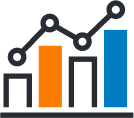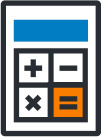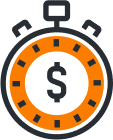Knowledge Center and Mortgage FAQs
Mortgage Knowledge is Buying Power
How to Prepare for a Mortgage Loan

Check Your Credit
Review your credit report and dispute any errors. You get a free credit report every year on this website.

Set a Budget
A mortgage professional can help you review how much you could be approved for… AND how much you may have to spend on your loan payment each month. (They can be very different numbers.)

Plan for a Down Payment
Down payments vary by loan type. Conventional loans require as little as 3%. Talk to a mortgage broker about what fits your situation and goals.

Gather Key Documents
Expect to provide recent pay stubs, bank statements, tax returns, and ID. Having them ready makes pre-qualification faster.

Save for Extra Costs
Don’t stop saving now! Moving trucks, new furniture, and closing costs can add up fast.

Avoid Major Financial Changes
Hold off on switching jobs, financing a car, buying big pieces of furniture, or taking on new debt. These big moves could get in the way of YOUR big move (and your home loan).
Credit Score Basics
Motto Brokers Have Playbooks, Not Judgments
Higher scores = Better loan options, lower interest rates, and more negotiating power
Lower scores = Fewer loan choices and potentially higher costs
Excellent (760–850):
Best rates and terms
Good (700–759):
Solid loan options
Fair (640–699):
Possible approvals, but rates might be higher
Poor (below 640):
More limited options — but not impossible (with a good mortgage pro)
*As a general guideline, not specific determinants

Why Low Credit Isn’t a Dealbreaker (With a Good Broker)
A good mortgage broker can help you:
- Find flexible loan options like special programs designed for more forgiving approval (FHA, VA, and others).
- Identify your unique “quick wins” — things you can do now to bump your score (and things you should avoid).
- Advocate for you by explaining your full financial story to lenders, not just the numbers.
- Help you create a step-by-step plan to boost your credit if waiting a few months means potentially saving thousands.
- Strategize and communicate when to pull your credit and lock your loan for the best advantage.
Loan Options for Low (or No) Down Payment: Get a Little Help and Get Home Sooner
| Program | Good For | Down Payment |
|---|---|---|
| Fannie Mae HomeReady® | Low-to-moderate income buyers, especially those with strong rental history or multigenerational households | As low as 3% |
| Freddie Mac Home Possible® | First-time buyers, buyers earning less than 80% of area median income | As low as 3% |
| Local and Niche Programs | Buyers looking for additional grants, forgivable loans, or other closing cost assistance | Varies by state |
| FHA Loans | First-time buyers, buyers with lower credit scores, buyers with limited savings | As low as 3.5% |
| VA Loans | Eligible veterans, active-duty service members, and surviving spouses | 0% |
| USDA Loans | Buyers in eligible rural and suburban areas, often with moderate-to-low income | 0% |
Frequently Asked Questions
Questions? We Have Answers…
A mortgage broker is your matchmaker for home loans. They find mortgage loan options that fit your needs, so you don’t have to. Instead of applying to different places on your own, they shop around for products that fit your needs, then review and present you with your choices.
Motto has the ability to work with a large, pre-vetted group of wholesale lenders, giving borrowers more options and control. By shopping and comparing hundreds of home loan products from the wholesale network, Motto ensures that borrowers can find the best fit for their needs.
Interest rates are like a playlist that blends the hits and the deep cuts. Sure, your credit score and finances play a part, but the Federal Reserve and the 10-year Treasury yield are the real DJs. The Federal Reserve influences how expensive it is to borrow money in the U.S. overall, while the Treasury yield more directly impacts mortgage loan interest rates through the investment market. Put it all together, and you can get the rate that determines how much your loan might cost.
Your mortgage rate determines how much you’ll shell out every month. The lower the rate, the more you save. The higher the rate, well… think of it as paying a little extra to borrow the same amount. It’s the difference between cruising in economy or splurging on first class — same destination, different price.
It’s the cheat sheet for your mortgage payments. This tool shows how each payment chips away at both the loan balance and the interest. Over time, more of your payment goes toward the loan, less toward interest. It’s a satisfying glimpse into how your loan shrinks with each payment.
FHA loans are like a stepping stone into homeownership. Designed for buyers with less-than-perfect credit or smaller down payments, it offers a bit more flexibility than traditional loans. These loans allow borrowers who may not qualify for conventional loans to obtain a mortgage loan if they meet criteria set forth by the Federal Housing Administration, who insures the loan. These mortgage loans typically require a smaller down payment than other loan options but may also require the borrower to pay mortgage insurance for the life of the loan.
A home equity loan lets you tap into the value your house has built up over time. Need cash for a renovation, tuition, or other investment? You can borrow against your home’s equity and pay it back later. It’s your home pulling double duty.
Escrow is like a side account that quietly handles the boring stuff, like your property taxes and insurance. You pay extra with your monthly mortgage payment, and the money builds up in your escrow account until it’s time to cover those bills. It’s the invisible helping hand that works to keep things in check.
Fannie Mae and Freddie Mac aren’t a jazz duo, but they do keep the rhythm of the mortgage market steady. These two government-sponsored enterprises buy mortgages from lenders, making it easier for banks to offer loans. So, in a way, they’re behind the scenes, keeping the home loan business flowing.
Your debt-to-income ratio measures how much of your monthly income goes toward debt. Lenders use this number to figure out how much room you have for a new mortgage. It’s like your financial bandwidth—keeping track of how much you’re juggling before adding anything new.
Your mortgage broker can help:
- Find programs you qualify for (because there are a lot, and you shouldn’t have to dig through dozens of government websites to figure it out)
- Help you combine multiple types of assistance (yes, stacking is a thing)
- Walk you through what’s free, what’s repayable, and what’s just a great deal
- Guide you in meeting any deadlines or paperwork requirements
A refinance means replacing your current mortgage loan with a new one – usually to lock in a lower interest rate or shorter loan term. It can help you save money, reduce the total interest you pay, and even tap into your home equity.
A Motto pro can help you assess your situation and determine if refinancing is the right move. You’ll want to consider factors like changes in your home equity, credit score, and debt-to-income ratio.


